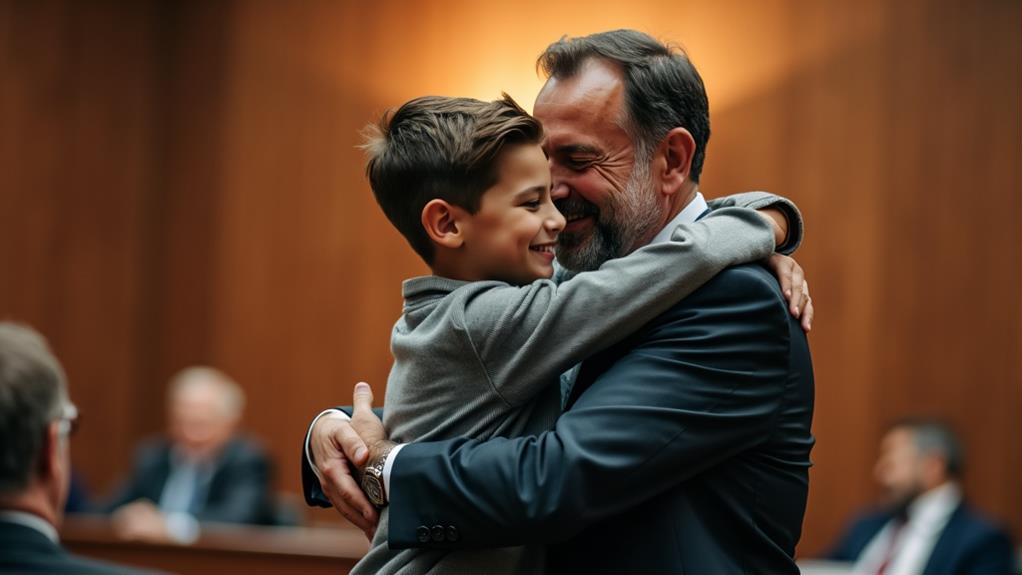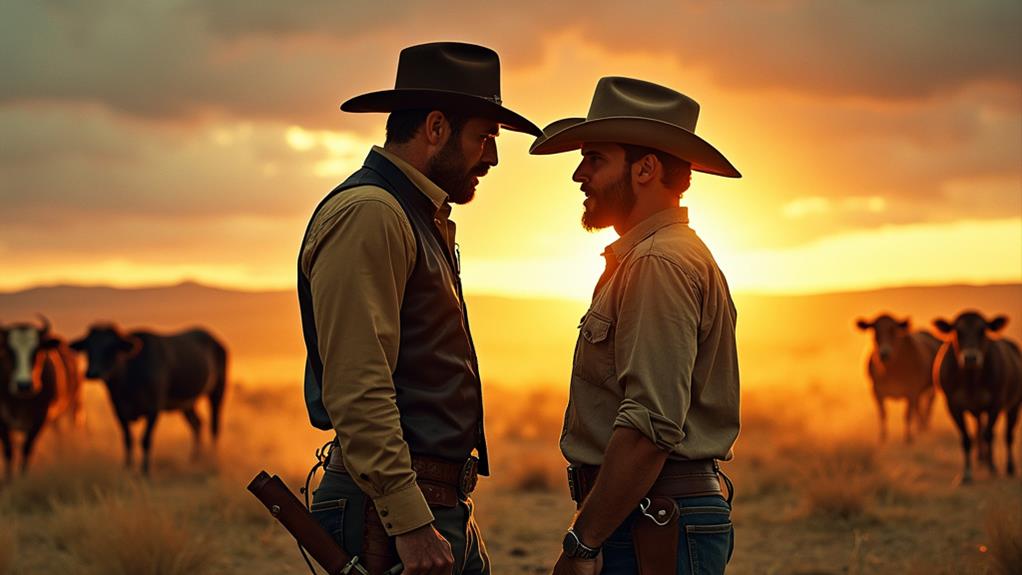Best Father-Son Movie Moments in Cinema History

When considering the most memorable father-son moments in cinema history, certain scenes are unforgettable. Films like *Back to the Future II* and *October Sky* capture the intricate dynamics of aspirations, tensions, and reconciliations.
The emotional depth is palpable as characters navigate expectations and dreams, sometimes clashing dramatically or finding unexpected harmony.
But what makes these portrayals so compelling, and how do they redefine our understanding of familial bonds and masculinity?
Let's delve deeper into these iconic interactions to uncover the elements that make them timeless in film history.
Back To The Future II (1989)
"Back To The Future II" (1989) offers an intriguing exploration of father-son dynamics with an innovative twist, highlighted by Michael J. Fox's impressive versatility. As Marty McFly, Fox navigates the complex relationship with his father, George McFly. The film emphasizes how George's decisions significantly influence Marty's future, providing a compelling examination of their bond.
Michael J. Fox not only portrays Marty but also other members of the McFly family, showcasing his talent and enriching the narrative. This multifaceted performance adds depth to the family dynamics, making them more engaging and intricate.
While the film may not reach the emotional depth of its predecessor, it compensates with entertaining elements and clever references, including an allusion to Oedipus that adds an intriguing layer to their relationship.
Despite its lighter tone, the film effectively underscores the importance of growth and support in father-son relationships. Marty's journey through different timelines illustrates how George's actions shape his son's life, reflecting the broader theme of how family choices resonate through generations.
"Back To The Future II" remains memorable for its unique take on these enduring themes.
My Life (1993)
Shifting focus from the time-traveling escapades of "Back To The Future II," "My Life" (1993) offers a deeply emotional and heartfelt story. In this poignant film, Bob Jones, played by Michael Keaton, grapples with the emotional weight of impending fatherhood as he records memories and life lessons for his unborn child.
The movie beautifully captures the parent-child bond through intimate moments like bedtime stories and shaving lessons, showcasing Bob's deep love for his family. As you watch, you'll feel the emotional weight of Bob's journey as he aims to impart wisdom and ensure his child grows up with a sense of his presence.
His heartfelt recordings are filled with life lessons, highlighting themes of love, sacrifice, and the desire to nurture across generations. These scenes are so powerful, you'll likely find yourself reaching for tissues.
"My Life" doesn't just focus on Bob's relationship with his child; it also investigates family dynamics through imagined alternate teaching moments, contrasting the parent-child bond with other familial relationships.
This film strikes a chord universally, touching on the fundamental human desire to leave a lasting legacy of love and wisdom.
Life As A House (2001)

*Life As A House* (2001) tells the poignant story of George and his estranged son, Sam, with heartfelt authenticity. George, a terminally ill architect portrayed by Kevin Kline, decides to use his remaining time to rebuild both a house and his fractured relationship with Sam, played by Hayden Christensen. As they work on constructing the house, it becomes a powerful metaphor for their emotional healing. The project symbolizes hope and redemption, offering a chance for forgiveness amidst George's impending death.
The film masterfully captures the essence of complex family dynamics, illustrating how the urgent need to reconnect brings them closer. Through heartfelt conversations and shared moments of bonding, George and Sam confront their past grievances and misunderstandings. The construction project acts as a catalyst for their emotional journey, showcasing the healing power of working towards a common goal.
| Themes | Characters | Impact |
|---|---|---|
| Father-Son Relationship | George & Sam | Emotional Healing |
| Redemption | George | Forgiveness |
| Complex Family Dynamics | George & Sam | Bonding and Understanding |
*Life As A House* received praise for its emotional depth, particularly highlighting the performances of Kline and Christensen, making it a standout depiction of father-son relationships in cinema.
The War (1994)
Next up is "The War" (1994), where Stephen's wartime experiences profoundly influence his approach to fatherhood. As he navigates his moral struggles, he shares these lessons with his son, Stu.
The treehouse becomes a poignant symbol of innocence and safety, capturing the complexities of communication and bonding amidst past traumas.
This film beautifully portrays the challenges and rewards of parenting in the shadow of a turbulent past.
Wartime Reflections and Tensions
The father-son dynamic in *The War* (1994) masterfully captures the emotional complexities of wartime reflections and tensions. Stephen, the father, grapples with his wartime experiences and the moral ambiguity between taking lives and saving them. This internal struggle profoundly affects his relationship with his son, Stu.
Stephen's aim is to impart wisdom through tales of his past, maneuvering the delicate balance between protecting his son's innocence and preparing him for life's harsh realities.
In this film, you witness how a father's love and his complex relationship with his son unfold through poignant moments of male bonding. Stephen's stories are more than just memories; they're lifelines meant to teach Stu about courage, morality, and compassion.
These reflections foster a deep understanding between father and son, creating a powerful narrative arc centered on love and respect.
- Father and son bonding over war stories
- Complex relationship influenced by wartime experiences
- Stephen's moral reflections affecting fatherly advice
- Emotional depth through male bonding
Symbolic Treehouse Moments
A sanctuary of innocence and safety, the treehouse in *The War* (1994) serves as a powerful symbol amidst the chaos of wartime conflict. It provides a refuge for the father-son relationship between Stephen (Kevin Costner) and his son, Stu, allowing them to bond away from the harsh realities of their world.
In this elevated haven, Stephen uses the treehouse to connect with Stu, creating shared experiences that strengthen their family ties. It embodies Stephen's desire to protect his son's childhood dreams and aspirations during tumultuous times.
Within its walls, discussions about morality and the complexities of wartime actions unfold, highlighting the tension between maintaining innocence and confronting brutal truths.
The treehouse scenes carry significant emotional weight, emphasizing themes of protection and the enduring bond between father and son. As they navigate their challenging environment, the treehouse symbolizes a commitment to shielding childhood innocence.
This setting illustrates how, even amidst adversity, a father's love and guidance can provide a sanctuary, fostering resilience and hope in the next generation.
Liar, Liar (1997)

In *Liar, Liar* (1997), Jim Carrey delivers a standout performance as Fletcher Reede, a lawyer whose compulsive lying jeopardizes his relationship with his son, Max. The film masterfully combines humor and emotional depth, making it a memorable exploration of father-son dynamics.
Fletcher's career-driven lifestyle initially takes precedence over his role as a father, but a magical spell compelling him to speak the truth forces him to reevaluate his priorities.
Under the spell's influence, Fletcher races to the airport to reach Max, underscoring the importance of honesty and family. This pivotal scene marks a significant turning point in their relationship, highlighting the necessity of genuine connection and presence.
Key elements of the film include:
- Heartfelt Promises: Fletcher's enforced honesty leads to sincere promises that fortify his bond with Max.
- Airport Scene: A crucial moment where Fletcher's urgency to reach Max emphasizes the emotional weight of their relationship.
- Comedic Chaos: Fletcher's day of truth-telling brings humor and underscores the importance of honesty in familial relationships.
- Golden Globe Nomination: Jim Carrey's performance earned critical acclaim, illustrating the film's impact.
Ultimately, *Liar, Liar* emphasizes the significance of truthfulness and presence in a father-son relationship.
October Sky (1999)
In "October Sky," Homer Hickam dreams of rockets while his father insists on a future in coal mining. Their relationship is marked by tension and moments of admiration, especially as Homer's dedication to his passion begins to earn his father's respect.
The film's climax, where Homer successfully launches his rocket, beautifully captures the shift in their dynamic and underscores themes of perseverance and familial love.
Aspirations and Expectations Clash
In *October Sky* (1999), tension simmers between aspirations and expectations as Homer Hickam dreams of becoming a rocket scientist despite his father's insistence on a future in coal mining.
This film, based on a true story, highlights the profound influence of fathers on their children's ambitions. Homer's relationship with his father, portrayed by Chris Cooper, is fraught with a complex dynamic where love and duty often collide.
Homer's aspirations are ignited by the launch of Sputnik, propelling him to pursue rocketry in a town steeped in coal mining tradition. His father's expectations are grounded in the harsh realities of their working-class life, fearing for Homer's prospects outside the mines.
This conflict culminates when Homer's father destroys one of his rockets, symbolizing the profound tension between paternal fears and a son's desire to break free.
- Inspiration from Sputnik: Fuels Homer's rocketry dreams.
- Father's Expectations: Rooted in coal mining tradition.
- Destruction of the Rocket: A pivotal, heartbreaking moment.
- Journey to Reconciliation: Illustrates the triumph of personal aspirations over familial pressures.
Ultimately, *October Sky* beautifully narrates how pursuing one's passion can bridge even the most complicated relationships.
Tension and Admiration Dynamics
Homer Hickam's aspirations to become a rocket scientist clash with his father's coal-mining expectations, creating a complex dynamic of tension and admiration. This tension stems from their differing visions for the future, leading to a palpable strain in their relationship. Each interaction between them is laden with unspoken expectations, highlighting their conflicting perspectives.
Homer's admiration for Wernher von Braun contrasts sharply with the validation he seeks from his father. This dual admiration underscores the generational clash between ambition and duty. As Homer dedicates himself to building rockets, his father struggles to comprehend his son's defiance, further intensifying their tension.
However, this very tension catalyzes a profound transformation in their bond. The emotional climax of October Sky occurs when Homer ultimately earns his father's respect. This pivotal moment encapsulates their journey from conflict to mutual understanding and admiration.
It serves as a powerful reminder that even the deepest familial tensions can evolve into profound respect and appreciation, illustrating how admiration can emerge from the resolution of personal dreams and generational differences.
Coal-Mining Dreams Conflict
Homer Hickam's dreams of becoming a rocket scientist clash head-on with his father's coal-mining legacy, creating a compelling narrative in October Sky (1999). The film, based on a true story, captures the intense conflict between Homer's aspiration and his father's expectations. Jake Gyllenhaal's portrayal of Homer and Chris Cooper's performance as his father dramatize this tension, making their relationship both relatable and poignant.
A pivotal scene showcases an argument between Homer and his father about his future. Homer's determination to pursue rocketry is met with his father's insistence on maintaining the family's coal-mining tradition. This moment encapsulates the emotional stakes of their relationship and the universal struggle between familial loyalty and personal dreams.
- Ambition vs. Tradition: Homer endeavors to break free from the coal-mining life.
- Emotional Stakes: The father-son relationship is fraught with tension.
- Powerful Performances: Gyllenhaal and Cooper deliver compelling portrayals.
- Theme of Reconciliation: Ultimately, Homer seeks his father's approval.
As Homer achieves success in building rockets, he not only fulfills his own dreams but also mends his relationship with his father, proving his potential and bridging the gap between their conflicting aspirations.
Field Of Dreams (1989)

"Field of Dreams" (1989), often celebrated as one of the most touching father-son films, narrates the story of Ray Kinsella, played by Kevin Costner.
Ray transforms his Iowa cornfield into a baseball diamond, driven by a mysterious voice urging him to "build it and he'll come." The film delves deeply into the father-son relationship, using baseball as a backdrop to explore themes of redemption and emotional depth.
Ray's journey is motivated by a desire to reconcile with his deceased father's legacy and their unspoken bond through their shared love of the sport.
One of the most iconic and heartwarming moments in cinema history occurs when Ray finally has the chance to play catch with his deceased father. This poignant scene symbolizes forgiveness and healing, offering an emotional reunion that resonates with audiences.
The film's use of magical realism enhances its profound impact, making it a quintessential story about the importance of family connections and the passage of time.
"Field of Dreams" has received critical acclaim, earning a rating of 7.5 on IMDb and being selected for preservation in the National Film Registry by the Library of Congress for its cultural significance.
The Son (2002)
Among the most gripping father-son movie moments, "The Son" (2002) by Jean-Pierre and Luc Dardenne stands out with its raw portrayal of grief and redemption. The film immerses you in the life of Olivier, a carpenter consumed by the loss of his son.
It masterfully explores the complexities of fatherhood, as Olivier becomes fixated on the young man responsible for his son's death. This fixation leads to intense emotional turmoil, compelling you to confront themes of revenge and forgiveness.
Olivier's journey offers a profound commentary on loss and the human condition. It prompts you to question how grief can dominate one's existence and lead to difficult moral choices. The narrative underscores the importance of connection and understanding, especially within strained familial bonds tested by tragedy.
- Grief: Olivier's journey through unimaginable sorrow.
- Fatherhood: The ethical and emotional challenges Olivier faces.
- Forgiveness: The arduous path toward reconciling with the past.
- Familial Bonds: The examination of strained and tested relationships.
"The Son" received critical acclaim for its intimate storytelling and character-driven narrative, making it a standout in international cinema.
Red River (1948)

In the timeless Western "Red River" (1948), the father-son dynamic between Thomas Dunson and his adopted son, Matt, captivates with its emotional complexity and intensity. John Wayne's portrayal of Dunson and Montgomery Clift's depiction of Matt bring to life a relationship forged in the rugged landscape of the Wild West. Their bond is built on mutual respect, but it's strained by Dunson's strict demeanor and Matt's growing desire for independence.
The film explores themes of fatherhood and vulnerability. Dunson's harshness contrasts sharply with Matt's compassionate nature, leading to an inevitable clash. This tension peaks during their climactic confrontation, revealing the emotional depth of their relationship. Despite the struggle for power, their bond ultimately prevails, culminating in a moving resolution that underscores the strength of their connection.
"Red River" stands out for its groundbreaking depiction of masculinity and emotional complexities in father-son dynamics. This classic Western not only received critical acclaim but also influenced future portrayals of family ties in cinema.
| Film Aspect | Dunson (Father) | Matt (Son) |
|---|---|---|
| Personality | Strict, rugged | Compassionate, independent |
| Key Conflict | Struggle for control | Desire for autonomy |
| Emotional Climax | Climactic confrontation | Testing of their bond |
| Resolution | Poignant reconciliation | Mutual respect and understanding |
Conclusion
You've journeyed through some of the most iconic father-son moments in cinema history. These films showcase the power of dreams, the significance of forgiveness, and the beauty of mutual understanding. They redefine the essence of fatherhood and sonship, touching hearts and leaving indelible impressions. The next time you watch *Back to the Future II*, *Life as a House*, or other classics, you'll experience the timeless magic of these unforgettable relationships.




